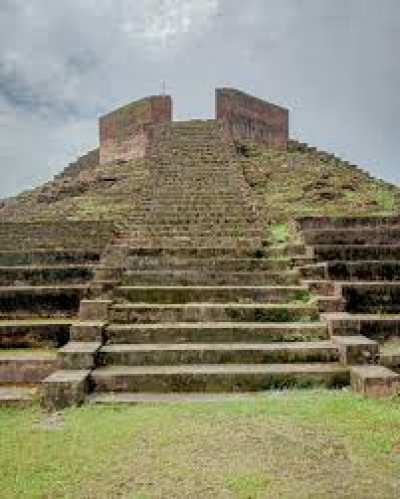In Depth
Fakuwa Dol is the crematorium of Sati Joymoti, located in Sivasagar near the historic Talatal Ghar. Built by King Rudra Singha in 1703–04 in memory of his mother, it is a pyramid-shaped temple situated on the banks of the Joysagar Tank.
It is said that Rudra Singha, in a further effort to honor the legacy of his mother Sati Joymoti, constructed this temple and placed a golden idol of her inside. Originally, it served as a moidam (grave) of Joymoti.
The temple had a circumference of approximately 90 feet (27 meters) and stood 30 feet (9.1 meters) tall from base to top. Surrounding it were eight brick pillars, which, along with the temple itself, are among the few surviving remnants of Ahom architecture in Assam.
Its structure bears a resemblance to a Mayan pyramid. Visitors often find it captivating, though it is in need of proper maintenance and care to preserve its historical significance
Historical Background
Sati Joymoti, the wife of Gadapani (later King Swargadeo Gadadhar Singha), is remembered in Assamese history for her unmatched bravery. When Gadapani went into hiding to escape political conspiracies, Joymoti was captured and tortured for refusing to reveal his whereabouts. She embraced death with dignity, becoming a symbol of supreme sacrifice and loyalty.
Over the centuries, it has come to represent not just a monument, but a symbol of Assamese pride, history, and identity.
Architectural Features
Fakua Dol showcases traditional Ahom architecture with influences of Hindu temple design. Built with stone and brick masonry, the structure stands as a testimony to medieval Assamese craftsmanship. The Dol is surrounded by natural greenery, giving the site a serene and spiritual ambiance.
Cultural Significance
The Joymoti Memorial Monument holds immense cultural and emotional value in Assam. It is often visited by historians, researchers, and tourists who want to explore Assam’s glorious past. The story of Joymoti has also inspired literature, films, and stage plays, making her legacy a cornerstone of Assamese cultural identity.
Visiting Fakua Dol
-
Location: Near Joysagar Tank, Sivasagar, Assam
-
Best Time to Visit: October to March (pleasant weather)
-
Attractions Nearby: Rang Ghar, Talatal Ghar, Kareng Ghar, Joysagar Tank
Conclusion
Fakua Dol is more than just a memorial - it is a reminder of Sati Joymoti’s sacrifice and Assam’s indomitable spirit. A visit to this monument offers not only a glimpse into the state’s glorious history but also a deeper connection with its cultural roots.
